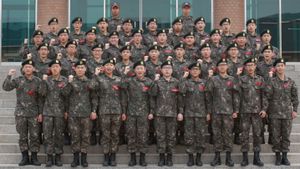European leaders gathered today in Kiev to mark the third anniversary of Russia's invasion of Ukraine, reinforcing their solidarity with the besieged nation. The meeting took place against the backdrop of increasing tensions and significant global attention, as leaders pledged new sanctions against Russia and announced substantial military assistance to Ukraine.
Kaja Kallas, the EU's top diplomat, revealed the implementation of the 16th package of sanctions against Russia, targeting new 'ghost tankers' utilized by the Kremlin to bypass existing restrictions on oil exports. Meanwhile, European Commission President Ursula von der Leyen unveiled plans for 3.5 billion euros of additional aid to Ukraine. She stated, "This struggle for survival is not just Ukraine’s destiny at stake. It is Europe’s destiny too," underscoring the battle's broader implications for European stability.
The discussion follows the results of last year's Pew Research survey, indicating strong but nuanced support for Ukraine among its allies. A segment of surveyed countries showed greater trust in President Vladimir Putin than President Volodymyr Zelensky, with nations such as Malaysia and Hungary expressing skepticism toward the Ukrainian leadership. Even as support remains firm from Eastern and some Western European countries, doubts linger elsewhere, particularly as countries like India and South Africa remain ambivalent about the conflict.
Vladimir Putin maintained his stance during the discussions, asserting on television, "Europeans have the right and opportunity to participate" in resolving the conflict. He has been vocal about his opinion of Zelensky, labeling him as increasingly "toxic" during his recent interviews. This characterization corresponds with criticism from various global leaders, including former U.S. President Donald Trump, who stated, "I love Ukraine, but Zelensky has done a terrible job," advocating instead for swift peace negotiations on terms he described as unfavorable for Ukraine.
Despite the somber atmosphere of the anniversary, Zelensky appeared optimistic, referencing talks to be held with 24 leaders through video conferencing. He noted, "We have an important meeting tomorrow, perhaps it will be pivotal," reflecting the urgency amid concerns over dwindling U.S. support following shifts seen since President Biden left office.
Putin's comments have not only targeted Zelensky but also suggest potential openings for collaboration between the U.S. and Russia. He welcomed Trump's discussion on reducing military spending among nuclear powers like the U.S., Russia, and China. The Russian leader hinted at existing contacts between American and Russian companies for future economic cooperation within Ukraine's mineral resources, underscoring his intention to move forward with international initiatives.
European leaders have expressed worries about the perception of negotiations occurring without Ukrainian representation. Ursula von der Leyen emphasized during the meeting, "We must mobilize and accelerate our efforts," urging for defense investment decisions to be expedited or risk irrelevance.
Conversely, the European Union has resisted unilateral action, with the presence of 13 leaders reflecting collective support against any peace deal deemed inadequate for Ukraine. This aligns with rising concerns about Trump's favored approach to the negotiation process, which reportedly prioritizes American business interests, particularly concerning Ukraine's rich mineral reserves.
With the backdrop of the anniversary serving as both reminder and call to action, the situation continues to evolve. A potential summit involving major powers could shift the dynamics dramatically. France's Emmanuel Macron is set to meet with Trump to articulate the existential threat posed by Russia to Europe, bolstered by concerted efforts among European nuclear powers for potential deployments post-conflict.
Critics remain concerned: will Zelensky's leadership withstand international scrutiny and internal dissent as pressures mount? With the discussions on future military strategies alongside sanctions and economic partnerships proceeding, the international community watches closely, as the consequences of these developments could extend far beyond the current conflict.
Despite significant external support, the sustainability of Zelensky's government—and Ukraine's path moving forward—remains uncertain. Pressures multiply as geopolitical alliances are tested and the specter of historical negotiations looms large.



